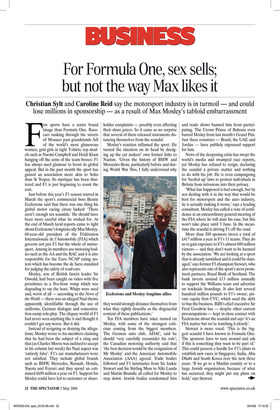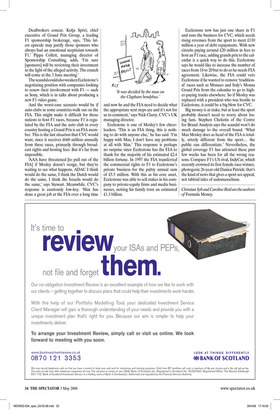busiNess
For Formula One, sex sells; but not the way Max likes it
Christian Sylt and Caroline Reid say the motorsport industry is in turmoil — and could lose millions in sponsorship — as a result of Max Mosley’s tabloid embarrassment Few sports have a sexier brand image than Formula One. Racecars snaking through the streets of Monaco past grandstands full of the world’s most glamorous women; grid girls in tight T-shirts; top models such as Naomi Campbell and Heidi Klum hanging off the arms of the team bosses: F1 has always used glamour to boost its global appeal. But in the past month the sport has gained an association more akin to Soho than St Tropez. Its mystique has been shattered and F1 is just beginning to count the cost.
Just before this year’s F1 season started in March the sport’s commercial boss Bernie Ecclestone said that there was one thing his global motor racing circus lacked: ‘There aren’t enough sex scandals.’ He should have been more careful what he wished for. At the end of March lurid reports came to light about Ecclestone’s longtime ally Max Mosley, 68-year-old president of the Fédération Internationale de l’Automobile (FIA) which governs not just F1 but the whole of motorsport. Among its members are motoring bodies such as the AA and the RAC and it is also responsible for the Euro NCAP rating system which has become the de facto standard for judging the safety of road cars.
Mosley, son of British fascist leader Sir Oswald, had been caught on video with five prostitutes in a five-hour romp which was degrading to say the least. Whips were used and, worst of all — according to the News of the World — there was an alleged Nazi theme apparently identifiable through the use of uniforms, German dialogue and concentration-camp role-play. The cliquey world of F1 had never seen anything like it and thought it couldn’t get any worse. But it did.
Instead of resigning or denying the allegations, Mosley wrote to his members claiming that he had been the subject of a sting and that (as Charles Moore was inclined to accept in his column last week) the Nazi aspect was ‘entirely false’. F1’s car manufacturers were not satisfied. They include global brands such as BMW, Mercedes, Renault, Honda, Toyota and Ferrari and they spend an estimated £650 million a year on F1. Support for Mosley could have led to customer or share holder complaints — possibly even affecting their share prices. So it came as no surprise that several of them released statements distancing themselves from the scandal.
Mosley’s reaction inflamed the sport. He turned the situation on its head by dredging up the car makers’ own former links to Nazism. ‘Given the history of BMW and Mercedes-Benz, particularly before and during World War Two, I fully understand why they would strongly distance themselves from what they rightly describe as the disgraceful content of these publications.’ Ten FIA members have since turned on Mosley, with some of the strongest criticism coming from the biggest members. The German auto club, ADAC, said he should ‘very carefully reconsider his role’; the Canadian motoring authority said that ‘the best decision would be the resignation of Mr Mosley’ and the American Automobile Association (AAA) agreed. Trade bodies followed and F1 luminaries from Sir Jackie Stewart and Sir Stirling Moss to Niki Lauda and Martin Brundle all called for Mosley to step down. Jewish bodies condemned him and trade shows banned him from participating. The Crown Prince of Bahrain even barred Mosley from last month’s Grand Prix. Just three countries — Brazil, the UAE and Jordan — have publicly expressed support for him.
News of the deepening crisis has swept the world’s media and swamped race reports, yet Mosley has refused to resign, declaring the scandal a private matter and nothing to do with his job. He is even campaigning for ‘beefed up’ laws to protect individuals in Britain from intrusions into their privacy.
‘What has happened is bad enough, but by not dealing with it in the way that would be best for motorsport and the auto industry, he is actually making it worse,’ says a leading consultant. Mosley has called a vote of confidence at an extraordinary general meeting of the FIA where he will state his case, but this won’t take place until 3 June. In the meantime the scandal is driving F1 off the road.
More than 300 sponsors invest a total of £417 million a year in F1’s 11 teams. They do so to gain exposure to F1’s almost 600 million viewers — and they don’t want to be harmed by the association. ‘We are looking at a sport that is already tarnished and it could be damaged,’ says former F1 champion Stewart, who also represents one of the sport’s most prominent partners, Royal Bank of Scotland. The bank invests around £13 million annually to support the Williams team and advertise on trackside hoardings. It also lent several hundred million pounds to F1’s owner, private equity firm CVC, which used the debt to buy the business. RBS’s chief executive Sir Fred Goodwin has — despite other current preoccupations — kept in close contact with Ecclestone about the scandal and says ‘it’s an FIA matter but we’re watching it closely’.
Stewart is more vocal: ‘This is the biggest scandal I have known in Formula One. The sponsors have to turn around and ask if this is something they want to be part of.’ This could present a hurdle for F1’s plans to establish new races in Singapore, India, Abu Dhabi and South Korea over the next three years. ‘If we go to a Muslim country or to a large Jewish organisation, because of what has occurred, they might put any plans on hold,’ says Stewart. Dealbrokers concur. Kolja Spöri, chief executive of Grand Prix Group, a leading F1 sponsorship brokerage, says, ‘This latest episode may justify those sponsors who always had an emotional scepticism towards F1.’ Pippa Collett, managing director of Sponsorship Consulting, adds, ‘I’m sure [sponsors] will be reviewing their investment in the light of the alleged activity. The crunch will come at the 3 June meeting.’ The scandal could also weaken Ecclestone’s negotiating position with companies looking to renew their involvement with F1 — such as Sony, which is in talks about producing a new F1 video game.
And the worst-case scenario would be if auto clubs in some countries walk out on the FIA. This might make it difficult for those nations to host F1 races, because F1 is regulated by the FIA and the auto club in every country hosting a Grand Prix is an FIA member. This is the last situation that CVC would want, since it receives £660 million annually from these races, primarily through broadcast rights and hosting fees. But it’s far from impossible.
‘AAA have threatened [to pull out of the FIA] if Mosley doesn’t resign, but they’re waiting to see what happens. ADAC I think would do the same, I think the Dutch would do the same, I think the Israelis would do the same,’ says Stewart. Meanwhile, CVC’s response is cautiously low-key. ‘Max has done a great job at the FIA over a long time and now he and the FIA need to decide what the appropriate next steps are and it’s not for us to comment,’ says Nick Clarry, CVC’s UK managing director.
Ecclestone is one of Mosley’s few cheerleaders. ‘This is an FIA thing, this is nothing to do with anyone else,’ he has said. ‘I’m happy with Max, I don’t have any problems at all with Max.’ This response is perhaps no surprise since Ecclestone has the FIA to thank for the majority of his estimated £2.4 billion fortune. In 1997 the FIA transferred the commercial rights to F1 to Ecclestone’s private business for the paltry annual sum of £5.5 million. With this as his core asset, Ecclestone was able to sell stakes in his company to private-equity firms and media businesses, netting his family trust an estimated £1.3 billion. Ecclestone now has just one share in F1 and runs the business for CVC, which needs rising revenues from the sport to meet £110 million a year of debt repayments. With new circuits paying around £20 million in fees to host an F1 race, adding grands prix to the calendar is a quick way to do this. Ecclestone says he would like to increase the number of races from 18 to 20 but to do so he needs FIA agreement. Likewise, the FIA could veto Ecclestone if he wanted to remove ‘traditional’ races such as Monaco and Italy’s Monza Grand Prix from the calendar to go to higher-paying tracks elsewhere. So if Mosley was replaced with a president who was hostile to Ecclestone, it could be a big blow for CVC.
Big money is at stake, but at least the sport probably doesn’t need to worry about losing fans. Stephen Cheliotis of the Centre for Brand Analysis says the scandal won’t do much damage to the overall brand. ‘What Max Mosley does as head of the FIA is totally, utterly different from the sport... the public can differentiate.’ Nevertheless, the global coverage F1 has attracted these past few weeks has been for all the wrong reasons. Compare F1’s US rival, IndyCar, which recently crowned its first female race-winner, photogenic 26-year-old Danica Patrick: that’s the kind of news that gives a sport sex appeal, not tabloid tales of sadomasochism.
Christian Sylt and Caroline Reid are the authors of Formula Money.



















































































 Previous page
Previous page